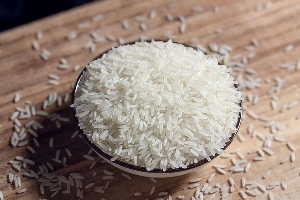Rice has become a major staple food in Ghana due to changing dietary preferences and rapid urbanization. This phenomenon has led to significant profitability of the rice business sector touching every actor in the value chain, most importantly the resource-poor farmer. However, the full productivity of the crop is usually not realized due to several constraints exacerbated by the constantly changing climate.
Notable among these constraints is salinity, as rice is highly sensitive even at moderate levels of salt stress compared to other cereals like barely, wheat and maize. In coastal areas in the country where rice farming is a major source of livelihood, saltwater intrusion contaminates fields, while in inland regions, irrigation practices and natural soil conditions can lead to salt accumulation.
In Ghana, it's estimated that over 30% of irrigated rice fields are affected by varying degrees of salinity. This does not only reduce yields but also restricts the expansion of rice cultivation into potentially productive areas. As rice consumption continues to rise across the country, addressing salinity tolerance has become a top priority for ensuring food security and supporting local economies.
Developing rice varieties with improved salinity tolerance offers a sustainable and cost-effective solution to this challenge. Saline-tolerant breeding lines serve as valuable genetic resources, allowing breeders to incorporate salt tolerance traits into high-yielding, locally adapted varieties.
These lines typically possess mechanisms for excluding salt uptake at the root level, compartmentalizing sodium ions in vacuoles, maintaining favorable potassium-sodium ratios in tissues, and producing osmolytes for cellular protection.
By crossing these tolerant lines with farmer-preferred commercial rice varieties, breeders Ghana from the Savanna Agricultural Research Institute (SARI) and Crop Research Institute (CRI) can create new cultivars that maintain productivity under saline conditions while retaining desirable agronomic traits.
At the forefront of this critical research is Dr. Nana Kofi Abaka Amoah, a distinguished scientist at the Africa Rice Center in Côte d'Ivoire.

Dr. Nana Kofi Abaka Amoah, Molecular Breeder, Africa Rice Center
Dr. Amoah has established himself as a leading expert in developing parental lines for rice breeding to address salinity stress in African rice ecosystems, including Ghana.
His work combines cutting-edge molecular techniques with traditional breeding approaches to identify and enhance salinity tolerance traits. His research has focused on screening diverse rice germplasm for salinity tolerance, identifying novel quantitative trait loci (QTLs) associated with salt tolerance, developing marker-assisted selection tools for efficient breeding, and creating and evaluating advanced breeding lines under field conditions.
These studies have not only expanded the genetic resources available for breeding programs but have also provided valuable insights into the physiological and molecular basis of salt tolerance in rice.
The breeding lines developed by Dr. Amoah and his team are already making a significant impact across Africa. Several national breeding programs, including those in Ghana, Senegal, the Gambia and Mali, have incorporated these materials into their efforts to create locally adapted, salt-tolerant varieties.
Early field trials of varieties derived from these breeding lines have shown promising results, with yield advantages of 20-30% under moderate salinity stress compared to standard cultivars. This translates to tangible benefits for farmers in affected areas, potentially increasing food security and income generation.
While significant progress has been made, continued research and development are essential to address the evolving challenges of rice production in Africa.
Future work should focus on pyramiding multiple salinity tolerance genes to ensure a more comprehensive adaptation of the crop to real-time constraints in the field. exploring the potential of wild rice relatives as sources of novel tolerance traits, developing varieties with combined tolerance to salinity and other stresses (e.g., drought, heat), and improving the efficiency of breeding programs through genomic selection and speed breeding techniques.
Opinions of Saturday, 26 October 2024
Columnist: Alex Yeboah
Improving productivity of rice to salinity stress in Ghana
Entertainment














